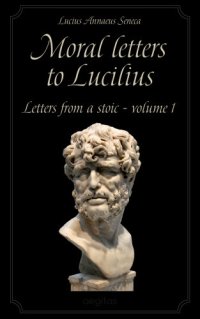
Ebook: Moral letters to Lucilius
Author: Seneca Lucius Annaeus
The Roman statesman and philosopher Seneca (4 BCE-65 CE) recorded his moral philosophy and reflections on life as a highly original kind of correspondence. Letters on Ethics includes vivid descriptions of poetry and oratory, and philosophical training for Seneca's friend Lucilius. This volume, the first complete English translation in nearly a century, makes the Letters more accessible than ever before. Written as much for a general audience as for Lucilius, these engaging letters offer advice on how to deal with everything from nosy neighbors to sickness, pain, and death. Seneca uses the informal format of the letter to present the central ideas of Stoicism, for centuries the most influential philosophical system in the Mediterranean world. His lively and at times humorous expositions have made the Letters his most popular work and an enduring classic. Including an introduction and explanatory notes by Margaret Graver and A.A. Long, this authoritative edition will captivate a new generation of readers. -- from dust jacket.;Taking charge of your time -- A beneficial reading program -- Trusting one's friends -- Coming to terms with death -- Our inward and outward lives -- Intimacy within friendship -- Avoiding the crowd -- Writing as a form of service -- Friendship and self-sufficiency -- Communing with oneself -- Blushing -- Visiting a childhood home -- Anxieties about the future -- Safety in a dangerous world -- Exercises for the body and the voice -- Daily study and practice -- Saving for retirement -- The Saturnalia festival -- The satisfactions of retirement -- The importance of being consistent -- How reading can make you famous -- Giving up a career -- Real joy is a serious matter -- Courage in a threatening situation -- Effective teaching -- Growing old -- Real joy depends on real study -- Travel is no cure for depression -- A disillusioned friend -- An Epicurean on his deathbed -- Our mind's godlike potential -- Steadiness of aim -- The use of philosophical maxims -- Willingness is the key -- Learning to be a friend -- Helping another maintain his commitment -- Service to philosophy is true freedom -- Fewer words achieve more -- Healthy and unhealthy desires -- Oratory and the philosopher -- God dwells within us -- Good people are rare -- Being the subject of gossip -- Noble birth -- A gift of books -- A book by Lucilius -- How we treat our slaves -- Tricks of logic -- Remembering old times -- Blindness to one's own faults -- The party town of Baiae -- Good learners and good teachers -- A bad experience at sea -- A near-fatal asthma attack -- Passing the home of a recluse -- Noisy lodging above a bathhouse -- A dark tunnel -- A conversation about Plato -- Steadiness of joy -- Our prayers are all amiss -- Preparing for death -- Living the inner life -- Consolation for the death of a friend -- Some analyses of causation -- All goods are equal -- All goods are choiceworthy -- The uses of retirement -- Combating one's faults -- Ending one's own life -- Life's highest good -- Finding time for study -- Gratitude toward rulers -- Only the honorable is good -- What it means to make progress -- Some proofs that only the honorable is good -- Facing death with courage -- Coping with bodily pain -- A trip around Sicily brings thoughts of glory -- A quiet day at home -- Gratitude for benefits received -- Syllogisms cannot make us brave -- Heavy drinking -- The writer's craft -- Some objections to Stoic ethics -- The rustic villa of Scipio Africanus -- Poverty and wealth -- The liberal arts -- The divisions of philosophy -- The beginnings of civilization -- A terrible fire at Lyon -- What we need for happiness -- A premature death -- The role of precepts in philosophy -- The role of general principles -- Complaints -- A trial in the time of Cicero -- The power of the mind -- Consolation for the death of a child -- A book by Papirius Fabianus -- A sudden death -- Renown and immortality -- Those we meet may be dangerous to us -- Why travel cannot set you free -- How to avoid being harmed by other people -- The corporeal nature of the good -- An unexpected misfortune -- Vegetarianism and the use of literature -- Mutual aid among the wise -- False fears and mistaken ideas of wealth -- What we lose with our tricks of logic -- A difficult pupil -- Is a virtue an animate creature? -- A debased style of eloquence -- Fine language will not help us -- The Stoic view of emotion -- Propositions and incorporeals -- A proper definition for the human good -- Natural wealth -- How we develop our concept of the good -- Self-awareness in animate creatures -- The hours of day and night -- Resisting external influences -- The criterion for the human good -- Fragments of other letters.
Download the book Moral letters to Lucilius for free or read online
Continue reading on any device:

Last viewed books
Related books
{related-news}
Comments (0)